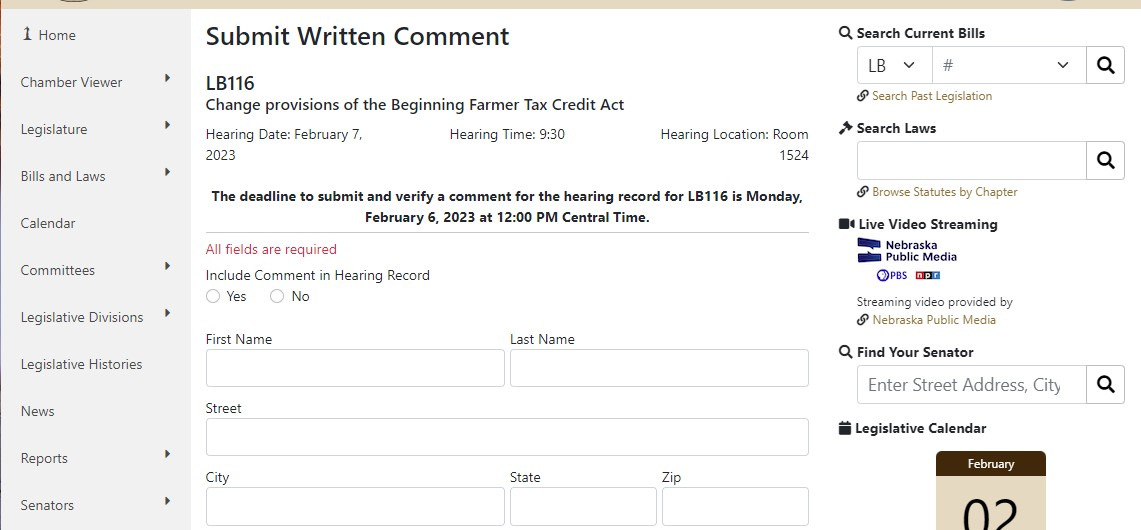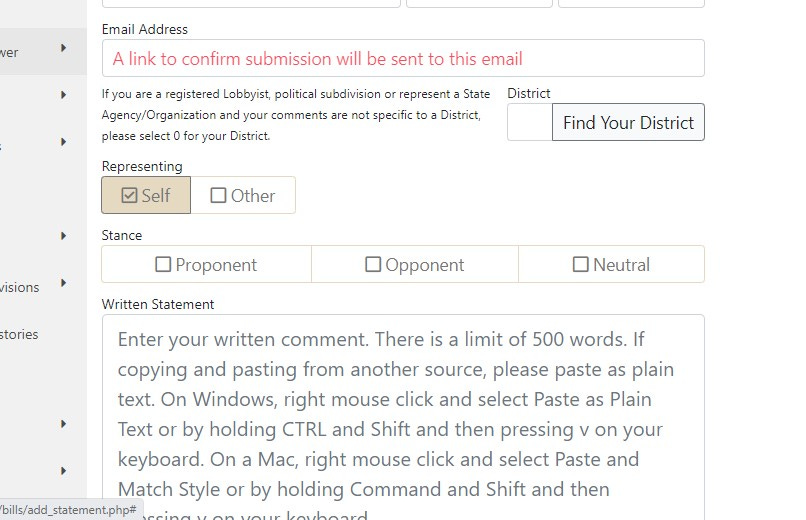by Sue Greenwald, MD
I am just as guilty as the next person. We get busy and assume someone else will take care of it. However, if this last 2 years has taught us anything, it is that our lack of due diligence leads inexorably to greater levels of tyranny from our government.
In Nebraska we are lucky. We are a huge state in land mass, but a small state in population and attitude. It’s easy to get to know our Nebraska Senators. They are great people. They would be the first to admit they don’t know everything and need help from experts in various fields, and especially non-experts with personal experience. There are only 49 of them and they WANT to know what we think. They welcome help from “Nebraska’s Second House”, which is us.
To that end, the Nebraska Legislature has created the most simple process in the world for the rest of us to use when we submit our opinions, and we need to submit our opinion much more frequently. This tutorial is meant to help you become accustomed to sharing your opinion on a regular basis, and having it attached to the correct bill at the correct time.
During the short legislative sessions that begin in January, the comment periods are quick and short. If you don’t have time to track bills, there are many civic groups who will do it for you. Pick one or two of your favorites and sign up for their mailing lists. (Some of my favorites are nffv.org, ne.gop, and protectnebraskachildren.org). They will notify you by email when it’s the right time to comment. When you receive a notification, comment RIGHT AWAY. The comment period is only about 2 days long and ends 24 hours before the committee hearing. Luckily, it takes very little time to complete this task.
Go to nebraskalegislature.gov and you will see the home page:
If you know the bill number, type it in the top right and click search. If you are looking for a proposed constitutional amendment, the identifier will begin with LR instead of LB. Find LR by clicking on the drop down arrow next to LB.
If you don’t know the number, you can go to Bills and Laws on the left to use key words or other filters to find it. If you find that your bill has been assigned to a committee, you can learn who is on the committee by clicking “Committees” on the left. Live video of committee hearings is available on the center right.
After finding your bill, you will get a page that looks like this:
You can read the bill by clicking on “introduced” or whatever it says under “Text Copies.” This is probably the trickiest thing to find on the otherwise user friendly site. The box requesting comments will be present at the beginning of the open comment period, which I will remind you is VERY BRIEF. If you miss the deadline, you can and should still email your Senator, but your comment will not be part of the hearing record.
When you find your bill to comment upon, there will be a pop-up stating that these comments are public record and that you should have no expectation of privacy. Click “I Understand” and the pop-up disappears. Click the circle saying “yes” that you want your comment to be included in the hearing record. If you don’t do that, your comment won’t count. It is vitally important that you have your comment count. More on that later.
Scroll down, enter your email. You may have one comment per email.
Your comment can be up to 500 words. You can type it right on the website, or you can use your word processor to type your statement and then copy and paste into the space for the statement. Be sure to check the box for “Proponent”, “Opponent”, or “Neutral”. At the bottom, submit your comment. Then go check your email!
You will need to verify your email before the comment counts.
This is the most important thing I want you to know:
YOU DON’T HAVE TO SAY ANYTHING!
Or just say “I am for this bill” or something equally as simple.
If you check the circle to include the comment in the hearing record, then check a box for Proponent or Opponent, YOU COUNT!
Why is this important? At the end of the hearing they announce how many online letters were sent by proponents and how many by opponents. This is before anyone has read a single letter. The Senators pay attention to those numbers. If the number is low, they think we are not interested. NUMBERS MATTER!
If you do have something to relate about the bill, especially from personal experience, say it! You don’t need to be eloquent, just speak from the heart. Be polite. The Senators will use the most heartfelt and educational comments during floor debate. Your experiences really help them help us.
Because we have a Unicameral system in Nebraska, citizens have a unique opportunity to be influential in the direction that our state legislature takes. The blame is ours if we squander that opportunity.
The author is a retired Pediatrician and a co-founder of the Protect Nebraska Children Coalition.






